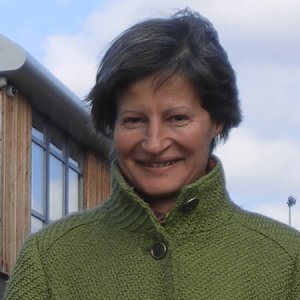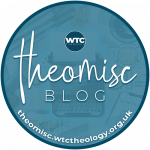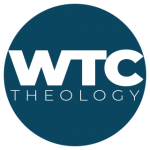Mary Douglas - God and Humanity Brought Together: The Incarnation as Gospel
INTRODUCTION
For my Masters’ dissertation with WTC, I researched the relationship we have with God through Jesus, as understood by one of the early Church Fathers, Athanasius. In doing this, I explored the implications for our understanding of the gospel. I was struck that, as Evangelicals, we talk so little about what Jesus’ life meant for us – not His death and resurrection but what happened because the Son of God lived as a human being! This so inspired me that I wanted to tell the world, so I wrote a summary of my dissertation, which the Evangelical Review of Theology has now published.
Lucy kindly invited me to write a short post on the background to my dissertation and why I ended up researching Athanasius. I’ve included the link to the article below.
HOW I GOT INTERESTED IN THIS TOPIC
I found myself asking endless questions about the atonement and how we communicate the gospel:
- What difference did Jesus make?
- Must God punish before He can forgive?
- What is the Church doing?
- What exactly is the gospel message?
What difference did Jesus make?
The world is in a mess, yet it seems that the gospel doesn’t have much impact. Sometimes I feel that Jesus doesn’t appear to have made much difference. Yet Jesus is God’s answer to the mess.
Must God punish before He can forgive?
Brad Jersak asked this question in a lecture. The more I pondered, the clearer the answer became: I know many people think God does need to punish, but I thought no, God does not need to punish before He can forgive. As parents, we punish our children and we forgive them, but one is not a pre-requisite to the other. How much more so for God, our perfect Father. In which case, what was Jesus’ death on the cross all about?
What is the Church doing?
“Where are the rest of My family?” A picture keeps coming back to me. Father God is rejoicing at a family gathering, but His gaze repeatedly turns towards the door, longing for those invited to the celebration who are not yet present.
“You never say my name.” The words of a song on the radio stopped me in my tracks. I felt God speak deep within me: “My Church never says My Name.” And I wept. Why do so many of us seldom speak the Name of Jesus? Why do we so often busy ourselves with so many other things and never tell the world about Jesus?
What exactly is the gospel message?
Traditional evangelistic outreaches, though enthusiastic and well-meaning, all too frequently produce little discernible impact. However, non-Christians respond warmly to offers of prayer. There is an openness to, even a longing for God which is not touched by the gospel we preach. Perhaps we busy ourselves with so many other things and don’t tell the world about Jesus because He doesn’t seem to offer a solution to the mess we see all around. Perhaps we should think afresh about the problem to which Jesus is God’s solution.
AND THEN I MET ATHANASIUS
For Athanasius, the problem is death. Separated from God Who is Life, humanity is dying. Deceived as to the nature of God, our God-given desire to be like God through relating to Him is distorted into the idolatrous desire to be like God independently from Him.
Christ, fully God and fully human, reconnects humanity to God within His person, bringing us back to life. Christ’s human will fully aligns with His divine will, restoring integrity to humanity. Christ, the Incarnate Word, transforms humanity through the dynamic God-human interaction within Him, creating a new humanity. In Christ, Son of God by nature, we are adopted by the Father, made sons by grace.
‘He Himself has made us sons of the Father,
and deified man by becoming Himself man.’
– Athanasius, Contra Arianos, 1:38
I had never heard this message before and I found it deeply attractive. For Athanasius, salvation is not primarily punishment and forgiveness as it is an antidote to rebellion and judgement; more connection and life as an antidote to separation and death.
Many of the contemporary questions of human identity and communication of the gospel are resolved by the profound interweaving of human and divine identity in Athanasius’ theology: a three-fold axis of generous Trinitarian God, humanity’s dual creature-image identity, and the complementarity of divine and human will. Athanasius demonstrates that human potential is fulfilled only in intimate relationship with God. This message touches the aching heart of human beings deprived of the knowledge of their Creator Who invites them to call Him Father. This gospel the Church can confidently proclaim.
As I researched Athanasius, wrestling with understandings of the Trinitarian God, human free will, and the relationship between them, God has poured His gracious revelation into the depths of my soul. My trust in God, my passion for Him, and the intensity of my worship of Him, have increased beyond measure. I urgently desire for the Church to embrace the fullness of the gospel of the early Church: to invite every person, so dearly loved by God, to know Him as their faithful Father.
If you would like to read the article in the journal, please CLICK HERE.
Evangelical Review of Theology, Feb 2021, Vol 45, pages 60-68, ‘God and Humanity Brought Together: The Incarnation as Gospel‘.
 Mary Douglas studied the Graduate Diploma and then completed the MA in Kingdom Theology with WTC in 2019. She lives in Salisbury and has been the Parenting for Faith networker for the southern region since April 2020.
Mary Douglas studied the Graduate Diploma and then completed the MA in Kingdom Theology with WTC in 2019. She lives in Salisbury and has been the Parenting for Faith networker for the southern region since April 2020.
Mary has worked with church leaders across many denominations, enabling evangelism and championing families, both locally and nationally. Having served God in politics for many years, Mary is acutely aware of the longing of the Father for all his children to know Him, and of every Christian parent for their children to love and walk with God.

TheoMisc Blog
Theological Miscellany is a blog where we post a variety of theological reflections on scripture, life, culture, politics, society, gender, and pretty much anything. WTC attracts a whole range of people as students and a wide range of faculty from around the world with different interests and theological leanings. What draws us all together is our commitment to a Christ-centred theology, taught in a Spirit-led fashion in partnership with the local church.
Come and Study With Us
 Our study of theology means engaging with a Kingdom that is powerful and transformational.
Our study of theology means engaging with a Kingdom that is powerful and transformational.
We offer programmes in ‘Kingdom Theology’ because at the heart of our study is the belief that Jesus came proclaiming the good news of the Kingdom of God. Through his life, death, and resurrection, he has brought the reality of the Kingdom to this world.
Find out more about WTC Programmes HERE.






